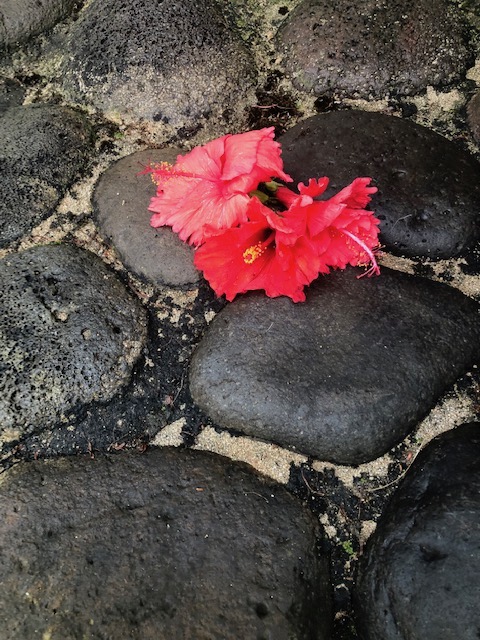Sunday, May 19, 2019
Fifth Sunday of Easter
Mental Health Sunday
"What would I say?"
The Rev. Kealahou C. Alika presented by Kahu Danette Kong
Acts 11:1-8 &
John 13:31-35

By now most of you know that Kiko, my canine companion over the last six years, died on Thursday afternoon. She was recovering from a surgical procedure that was done on Tuesday when she suffered a cardiac arrest.
The veterinarian was candid about her chances of recovery from a surgery that required removing a section of her small intestines that was perforated and had become infected. "She has a 50/50 chance of recovering," he said. "The next 72 hours will be critical."
The count on her white blood cells had dropped. By the second day she was given plasma because of the blood loss that occurred during the surgery. Other complications ensued.
I saw her four times during the week transporting her to the Central Maui Animal Clinic for overnight observation and care and then back to At Home Animal Clinic in Kahului. She surprised me the first morning I picked her up from her 24-hour care by walking out to our car.
She was able to walk the third day but by the fourth day, she began to shut down. I was at the Maui Memorial Medical Center visiting someone whose own health was tenuous when I received the call.
The veterinarian at the clinic let me know what happened and that it was best to put her "to sleep." I told him I was only five minutes away, but he said it was likely she would be gone by the time I could arrive at the clinic.
I said okay to having her euthanized, not wanting her to suffer. When I arrived at the animal hospital I asked about how it went. He said, "Kiko died on her own."
He brought her into the examining room on a green gurney. She was covered with a blue towel and there were three red hibiscus flowers by her side. She was still warm to the touch.
He said, "Take all the time you need" as he left the room.
I talked to her letting her know how much I loved her and that she was "a good dog." I had a chance to hug and kiss her and to stroke her back and side, her neck and head and to remember the six years we had together - although in many ways, it seemed like a lifetime and more.
She came into my life in 2013, a few months after I iost Hanu, the first dog in my life. Hanu was among the pups in Kiko's second litter. When Hanu died and Kiko came into my life, I promised Hanu I would take care of his mom.
Well, the truth be told, Kiko took care of me.
I know there are those who will say, "She was just a dog." But she was more than just as a dog. She was my dog.
It has not been easy week for me. But what I have come to realize is that in her dying, Kiko reminded me about the pain and anguish we all feel when we lose those we love. We know their names both human and canine. Bob, Fred and June were all faithful members of our church. Yesterday and in the next two weeks, we will have remembered and celebrated their lives.
More recently Ruth Rea and Sandra Perdue shared the news while visiting Maui, about the grief they were experiencing over the death of their 15-year-old Great Dane. A few months ago Dave and Kathy Lindsay, formerly of Maui and now Lacey, Washington bid aloha to Besk, their Border Collie and more recently Bruce and Cindee Burkitt of Wailea mourned the passing of their dog Kana.
It has been a time of difficult and sad farewells.
Our reading from The Gospel According to John falls within a section of the Biblical text that scholars generally refer to as the "farewell materials." "The public ministry of Jesus comes to an end and a farewell meal follows. Over the course of what is said to have occurred in a single evening, Jesus offers other words of farewell as well as a prayer. It concludes with his arrest in the garden.
"As farewell materials, it is both the preparation of Jesus' disciples for his coming death and the message of the glorified Christ to the church preparing them for life in the world following his departure" (Preaching through the Year C, Craddock, Holladay, Trinity International Press, Harrisburg, Pennsylvania, 1994, page 252). No other account in the Bible deals with the absence of Jesus and for the disciples it has become a major crisis in their lives.
"Jesus prepares them for a life that will no longer be the same, because he has to leave them. Yet he leaves them with a command and a charge that will have the power to transform the world. Jesus leaves his disciples with a legacy of love" (Living the Word, Reflections on the Lectionary, Aisha Brooks-Lytle, Christian Century, May 8, 2019, page 8).
He reminds the disciples, "Little children, I am with you only a little longer. You will look for me ... Where I am going, you cannot come" (John 13:33). One might suppose that he was belittling the disciples by calling them "little children" but I believe he was aware of the fear, anxiety and uncertainty of the disciples about what lay ahead. Rather than belittle the disciples, Jesus speaks in terms that are both personal and relational.
"The key to their understanding [of] what is happening and to their future is in their relationship to Christ and to one another" ( Op. cit.). He calls on them to love one another in the midst of "conflict, name-calling and deep division" ( Op. cit.)
We have experienced our share of disputes and differences in our own church family. At times, it seemed the future was uncertain.
What would I say to you as I think about the remaining months we have together in the shared ministry of this church? I would say, "You must love one another."
The challenge we face is whether or not we will love. Aisha Brooks-Lytle, an Executive Presbyter at the Presbytery of Greater Atlanta. points out: "It is easy to rationalize our way out of loving one another. We want to qualify love. We want to complicate it by adding stipulations as to who is worthy to receive it and who is not. We want to pat ourselves on the back for tolerating [those we perceive to be] the unlovable and loving those we tolerate" (Op. cit.).
If I have learned anything in Kiko' s passing and the passing of those we love, it is to remember we must not only love one another, we must also love God and we must love ourselves (Matthew 22:35-40; Mark 12:28-34; Luke 10:25-37). "Love has always been and will always be the answer for" you and for me. It is a "legacy that will lead us to hope in the midst of the brokenness we see" in our lives and in our world ( Op. cit.).

I stepped out of the church office early Friday morning and walked across the yard. I noticed an artificial red hibiscus flower on the ground. I had removed it from an artificial flower lei a week earlier but do not remember dropping it on the ground.
It reminded me of red hibiscus flowers that were laid beside Kiko on the gurney when the doctor brought her into the room where I was waiting. I picked up the flower and felt a great sense of comfort as though Kiko was saying, "I'm okay and you will be too."
What would I say to Kiko now? Dave and Kathy Lindsay sent a poem from a friend entitled "Farewell to a Beloved Dog." The author is unknown.
Except for a reference to fur, it could well be a poem about what Jesus said to the disciples and what he says to us today:
So this is where we part, my friend,
And you'll run on, around the bend,
Gone from sight, but not from mind,
With cherished memories left behind.
I will go on, I'll find the strength,
Life measures quality, not its length.
One long embrace before you leave,
Share one last look, before I grieve.
There have been others, that much is true,
But they are they, and they aren't you.
And I, fair, impartial, or so I thought,
Will remember well all you taught.
Your place I’ll hold, you will be missed,
The fur I stroked, the nose I kissed.
And know as you go to your final rest,
That while you were here ... I loved you best.
Jesus said, "Just as I have loved you, you also should love one another. By this everyone will know you are my disciples, if you have love for one another " (John 12:34b-35).
